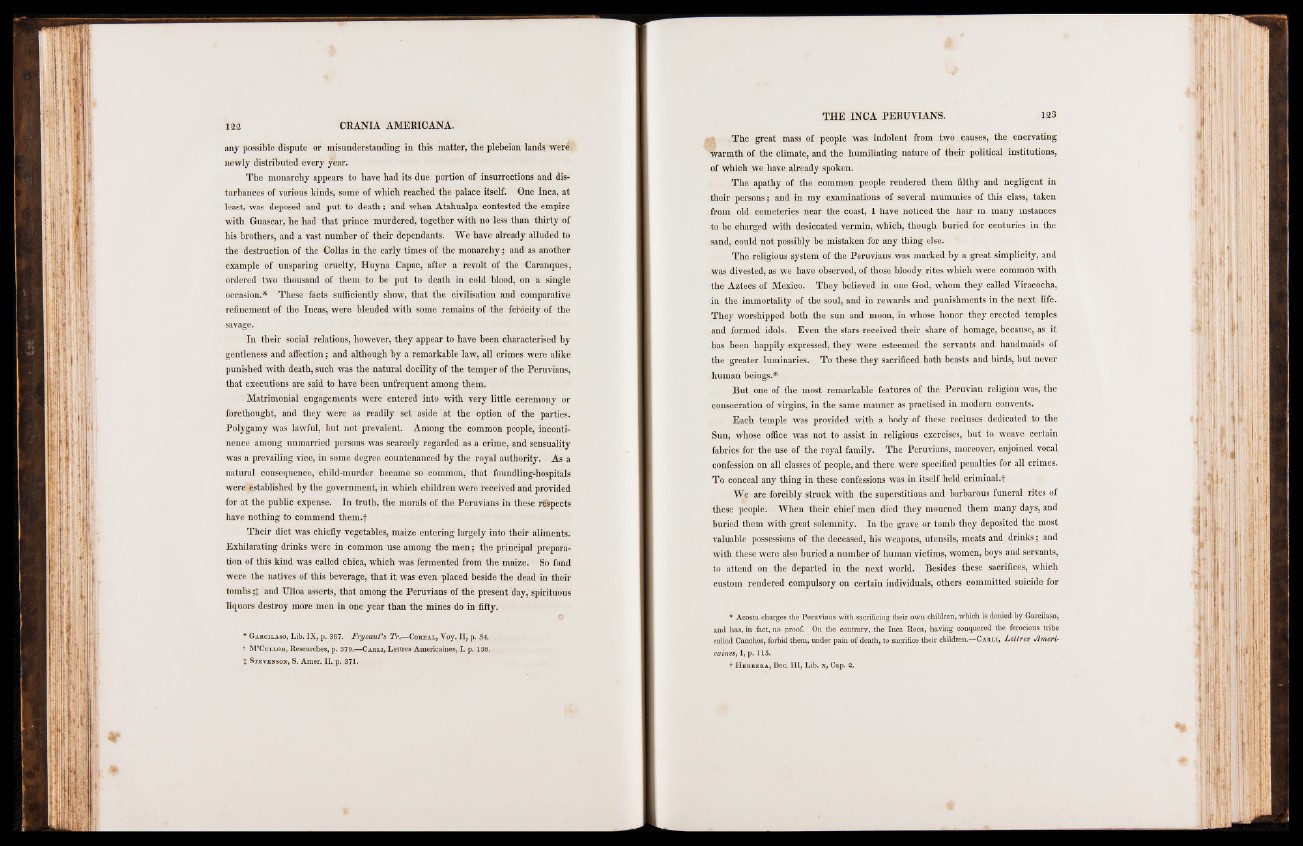
122 CRANIA AMERICANA.
any possible dispute or misunderstanding in this matter, the plebeian lands were
newly distributed every year.
The monarchy appears to have had its due portion of insurrections and disturbances
of various kinds, some of which reached the palace itself. One Inca, at
least, was deposed and put to death ; and when Atahualpa contested the empire
with Guascar, he had that prince murdered, together with no less than thirty of
his brothers, and a vast number of their dependants. We have already alluded to
the destruction of the Collas in the early times of the monarchy ; and as another
example of unsparing cruelty, Huyna Capac, after a revolt of the Caranques,
ordered two thousand of them, to be put to death in cold blood, on a single
occasion.* These facts sufficiently show, that the civilisation and comparative
refinement of the Incas, were blended with some remains of the felocity of the
savage.
In their social relations, however, they appear to have been characterised by
gentleness and affection ; and although by a remarkable law, all crimes were alike
punished with death, such was the natural docility of the temper of the Peruvians,
that executions are said to have been unfrequent among them.
Matrimonial engagements were entered into with very little ceremony or
forethought, and they were as readily set aside at the option of the parties.
Polygamy was lawful, but not prevalent. Among the common people, incontinence
among unmarried persons was scarcely regarded as a crime, and sensuality
was a prevailing vice, in some degree countenanced by the royal authority. As a
natural consequence, child-murder became so common, that foundling-hospitals
were ^established by the government, in which children were received and provided
for at the public expense. In truth, the morals of the Peruvians in these r%pects
have nothing to commend them.f
Their diet was chiefly vegetables, maize entering largely into their aliments.
Exhilarating drinks were in common use among the men ; the principal preparation
of this kind was called chica, which was fermented from the maize. So fond
were the natives of this beverage, that it was even placed beside the dead in their
tombs ;X and Ulloa asserts, that among the Peruvians of the present day, spirituous
liquors destroy more men in one year than the mines do in fifty.
* Garcilaso, Lib. IX, p. 367. F ry cant’s Tr.—Coreal, Yoy. II, p. 54.
t M’Culloh, Researches, p. 379.—Carli, Lettres Américaines, I. p. 138.
t Stevenson, S. Amer. II. p. 371.
The great mass of people was indolent from two causes, the enervating
warmth of the climate, and the humiliating nature of their political institutions,
of which we have already spoken.
The apathy of the common people rendered them filthy and negligent in
their persons; and in my examinations of several mummies of this class, taken
from old cemeteries near the coast, I have noticed the hair in many instances
to be charged with desiccated vermin, which, though buried for centuries in the
sand, could not possibly be mistaken for any thing else.
The religious system of the Peruvians was marked by a great simplicity, and
was divested, as we have observed, of those bloody rites which were common with
the AzteCs of Mexico. They believed in one God, whom they called Viracocha,
in the immortality of the soul, and in rewards and punishments in the next life.
They worshipped both the sun and moon, in whose honor they erected temples
and formed idols. Even the stars received their share of homage, because, as it
has been happily expressed, they were esteemed the servants and handmaids of
the greater luminaries. To these they sacrificed both beasts and birds, but never
human beings.*
But one of the most remarkable features of the Peruvian religion was, the
consecration of virgins, in the same manner as practised in modern convents.
Each temple was provided with a body of these recluses dedicated to the
Sun, whose office was not to assist in religious exercises, but to weave certain
fabrics for the use of the royal family. The Peruvians, moreover, enjoined vocal
confession on all classes of people, and there were specified penalties for all crimes.
To conceal any thing in these confessions was in itself held criminal.f
We are forcibly struck with the superstitious and barbarous funeral rites of
these people. When their chief men died they mourned them many days, and
buried them with great solemnity. In the grave or tomb they deposited the most
valuable possessions of the deceased, his weapons, utensils, meats and drinks; and
with these were also buried a number of human victims, women, boys and servants,
to attend on the departed in the next world. Besides these sacrifices, which
custom rendered compulsory on certain individuals, others committed suicide for
* Acosta charges the Peruvians with sacrificing their own children, which is denied by Garcilaso,
and has, in fact, no proof On the contrary, the Inca Roca, having conquered the ferocious tribe
called Canches, forbid them, under pain of death, to sacrifice their children.—Carli, L et Ires %/lmeri-
caines, I, p. 115.
t Herrera, Dec. Ill, Lib. x, Cap. 2.
%